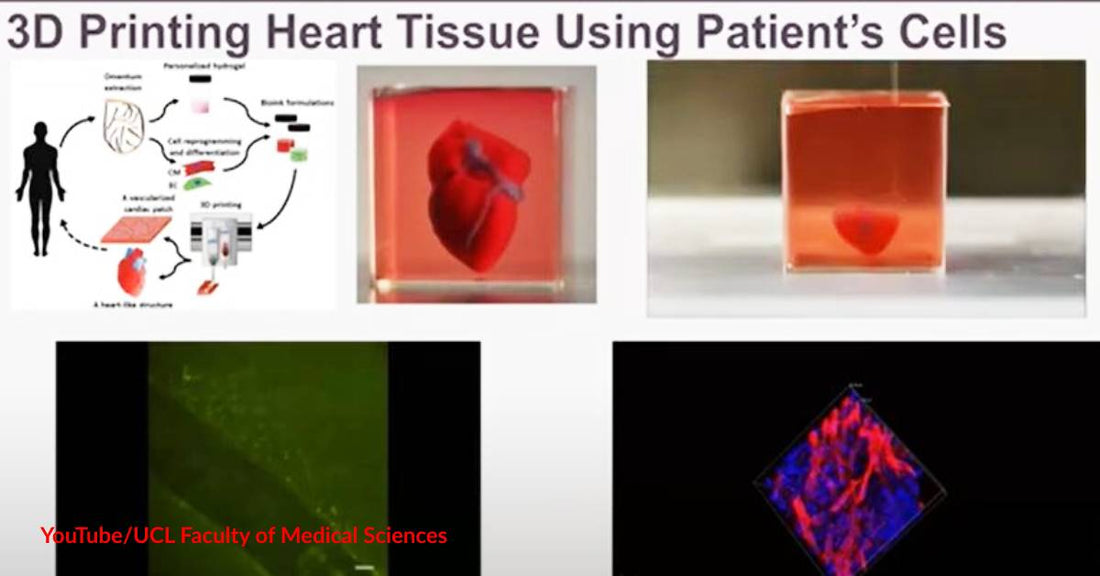3D Printed Organs Are Among Today’s Incredible Technological Advancements - Can We Now Delay Death?
Doris de Luna
Immortality has long been mankind's quest.
Or at least to live long enough until a person feels he's ready to say goodbye forever. Death is frightening for many of us, and almost everyone thinks it always comes rather untimely.
 Photo: YouTube/UCL Faculty of Medical Sciences
Photo: YouTube/UCL Faculty of Medical SciencesBut can today's advanced technology give us a satisfying amount of time to be ready for the inevitable? Can it now give us longer health and life spans so we don't have to say our last goodbye with regrets?
Well, there are several medical advancements and developments that offer bright hopes in delaying death, according to National Geographic:
- Regeneration of organ or tissue. There's a ligament in our knee that's called the anterior cruciate ligament (ACL), and this is the part that often suffers injury in sports. When this ligament gets torn, the only solution is to replace it with a tendon from another human or animal or from another part of the patient's body since it can't reattach or heal itself. But there's news that a Harvard professor is experimenting on a new technique that would make an ACL heal without tendon replacement. An hourglass-shaped sponge gets filled with the patient’s blood and growth factors, and it's inserted afterward into the injured area. The sponge also contains reactivated stem cells that will function as a bridge between the two torn ACL pieces. The bridge will grow and reconnect the torn ligament without any need for other soft tissues. This technique will not only enhance sports performance but may also help in lowering the incidence rate of arthritis in later life among persons who have undergone ACL surgeries.
- Artificial organs. If only they had unlimited funding, researchers at the Cleveland Clinic think they might have the capability to genetically regenerate hearts in less than three years and implant them in people who need such organs. But, as we wait for this breakthrough, there are now 3D printed organs with materials and mechanisms that function like real tissues. There's also an Australian company that created a robotic device which is capable of printing an individual's own skin cells. Just in case of skin damage due to burns or wounds, these regenerated cells could be used for repair. It is expected that in ten years' time, we could even have a computer code for everyone's body parts in cloud storage to be used in the production of 3D versions in times of need.
- Protein manipulation to fight against aging. In Korea, scientists are experimenting on roundworm cells and anti-aging drugs. They are manipulating activities of certain proteins in order to produce energy from sugar when the level of cellular energy is low. As a result, the roundworms are enjoying longer lives.
- Fix-it tools. Open heart-valve surgery entails a heavy risk, with 17 percent of patients eventually suffering from a decline in brain function. Other possible risks, according to Johns Hopkins Medicine, are infection, pneumonia, and blood clots that can result in heart attack or respiratory problems. But there is now a minimally invasive surgery for valve replacement, which involves feeding the new valve through a blood vessel into a patient's heart. It's still risky, but the surgery offers a shorter recovery time.
- High-tech toys. Now, we are able to have immediate consultations with doctors through various apps. The world is now also evolving faster with the help of artificial intelligence, virtual reality, advanced data collections, and other technological developments. This is why we can look forward to more effective drugs, diagnostics, and predictions concerning our health through AI. Another impressive innovation is a handheld ultrasound device from a Yale genetics researcher that's beneficial for wellness visits.
 Photo: YouTube/UCL Faculty of Medical Sciences
Photo: YouTube/UCL Faculty of Medical Sciences Photo: YouTube/UCL Faculty of Medical Sciences
Photo: YouTube/UCL Faculty of Medical Sciences Photo: YouTube/UCL Faculty of Medical Sciences
Photo: YouTube/UCL Faculty of Medical SciencesOf course, we expect these technologies to be very costly in the beginning due to high investments. As published by CNBC, "One of the biggest investment opportunities over the next decade will be in companies working to delay human death, a market expected to be worth at least $600 billion by 2025, according to one of Wall Street’s major investment banks. Bank of America Merrill Lynch analysts Felix Tran and Haim Israel believe that genome sequencers such as Illumina, high-tech players such as Alphabet, and biotech companies such as Novartis are on the cusp of 'bringing unprecedented increases to the quality and length of human lifespans.'"
But, as time and science progress, these death-delaying breakthroughs can be expected to become affordable to many people around the world. Indeed, immortality remains an impossible quest, but to be healthy for a much longer time will more than fill everyone's cup of happiness.
https://www.youtube.com/watch?v=giI0c6r1qN4


